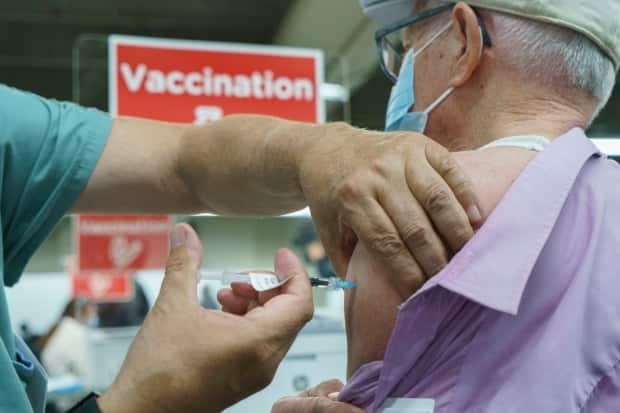Vaccines are 'weapons of mass reduction' in Quebec's fight against coronavirus variants, health minister says

Health Minister Christian Dubé occasionally offers cues at his media appearances that he is about to say something profound, or at least important.
At a news conference Tuesday, it was the phrase "I'm weighing my words here."
This he followed with the admission, "We're scared of this situation."
Dubé was talking about variant coronavirus strains, which are gaining ground despite the province's best efforts to keep a lid on them. The plateauing daily COVID-19 infection toll obscures an incipient wave, he said.
But there is also good news. Vaccines, Dubé said, are Quebec's "weapons of mass reduction" when it comes to the coronavirus, variant or not.
And as the province works to vaccinate another 700,000 people before the end of the month, he remains hopeful the race against the variants can be won.
Strict measures likely to continue
The fact that the variant curve shows signs of pointing upward, however, means Quebecers probably shouldn't expect the restrictive public health measures, like the curfew, to be lifted in the near future.
"[Variants] must be taken into consideration as we make big decisions," Dubé said.
Most of the wariness centres on Montreal, which has the largest number of confirmed cases of variants, and where the B117 strain (first identified in the United Kingdom) could soon become the dominant form of the virus.
But the problem is bigger than the province's largest city. Specialized screening reveals about 12 to 15 per cent of the daily positive tests in the province are due to a variant, a proportion that keeps increasing. Dozens of suspected variant cases are currently being investigated in multiple regions.
The Abitibi-Témiscamingue region has reported 40 cases of the B1351 variant discovered in South Africa, which is demonstrated to reduce the effectiveness of some vaccines.
Nearly three-quarters of those cases can be traced back to an outbreak in January, but 12 appear to be linked to a school in the town of Landrienne, where an outbreak occurred in mid-February.
"We received the news on Saturday night, the South African variant is, in fact, present in our region ... it wasn't a surprise given the outbreaks in the school in Landrienne, a CPE and now in a [seniors' residence]," said Dr. Lise Landry, the region's public health director.
Deploying an aggressive approach
According to Dr. Omobola Sobanjo, the region's medical advisor, the infectiousness of the strain, which has also been reported just over the provincial border in North Bay, Ont., may require reconsidering risks of infection.
Sobjano noted that many of those who were infected with the South African variant appeared to be contagious even in the latter stages of their 14-day isolation period.

Quebec has taken a stouter approach generally toward outbreaks in recent weeks, notably at four schools in the Quebec City area that were shut down entirely rather than on a classroom-by-classroom basis. It's very much by design.
"We are taking a very aggressive approach in terms of our interventions.... We are working under the assumption all over Quebec that these are all variants," Dr. Horacio Arruda, the province's public health director, said at Tuesday's news conference.
Arruda said the epidemiology suggests that while infection rates have plateaued for the time being, there are still worrying signs.
"The ocean is calm at the moment ... but underneath there are sharks," he said, "and I'll tell you what those sharks are: they're the variants."
Vaccination campaign moves to regions
On Tuesday, Dubé said that while the initial focus of the mass vaccination ramp-up is Montreal, it will soon be arriving in other regions as logistical hurdles are cleared.
The Montérégie, for example, has large numbers of seniors' residences, which makes for slow going because each must be served by a mobile vaccination unit.
The deal concluded with pharmacies last week means that when the roll-out arrives in outlying areas at mid-month, it will accommodate larger numbers.
The effort will be aided by the impending arrival of about 120,000 doses of the recently approved AstraZeneca-Oxford vaccine, which is easier to store and preserve.
But about half of Canada's initial shipment of the vaccine arrives with a best-before date of April 2, and the provincial immunization committee hasn't yet issued guidance on how best to use it.
Daniel Paré, the coordinator of the provincial vaccine effort, said the guidelines are expected any day now. He also made a promise: no dose will reach its expiry date unused.

 Yahoo Finance
Yahoo Finance 